Caring for a Senior Maltese Dog
Overview
As with all breeds, there is no exact age that a Maltese dog officially becomes a senior; however, most are declared to be so by the 8 to 9 year mark. And certainly by the age of 10-years-old, a Maltese is indeed a senior dog.
Many owners hesitate to consider this new phase, and wish that this declaration be held off as long as possible. However, there are important changes in care to take note of. And for this reason, it is wise to plan for this well in advance, and start following senior care guidelines by the 8 year mark.
Please note: PetMaltese is reader-supported. Some of the product suggestions on this page are affiliate links. As an Amazon Associate we earn from qualifying purchases. This is at no extra cost to you and helps us continue creating useful content.

Changes to Expect as a Maltese Transitions into a Senior
As a Maltese grows older and reaches the senior years, there will be lots of changes. This typically includes:
- Decreased hearing
- Decreased vision
- A general slowing down (there will be changes in both duration and speed of activity)
- Intolerance for new or 'busy' elements
- Increased sleep
- Dryer skin and coat
- Decreased appetite
- Lower tolerance for temperature changes
The care tips ahead will address these elements and more.
Tip #1 Start Taking Your Maltese for Geriatric Wellness Checks
One of the most important care tips for senior Maltese dogs is that veterinary wellness checks need to be performed twice per year, as opposed to once per year for their younger counterparts.
As dogs age, they are more prone to illness and conditions, and waiting a full year for screenings prevents early detection, which is crucial for successful treatment and recovery.
At these twice-per-year vet visits, the testing will be similar to wellness checks for adult dogs: a physical exam, blood chemistry testing, a complete blood count, urinalysis, thyroid screening, stool testing, and blood pressure measurement.
In addition, for seniors there should also be a glaucoma screen, retinal exam, and for certain Maltese x-rays will be taken which can reveal things about the lungs, heart, liver, and kidneys.
Tip #2 Take Note of Vision or Hearing Changes
While decreased vision and hearing is quite common with older dogs, this does not mean that noticeable changes should be written off as senior issues.
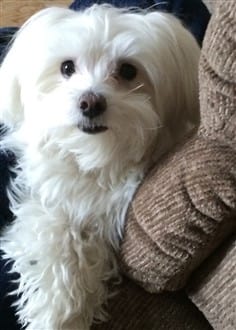
Keep in mind that temporary deafness can be the result of excessive wax buildup or ear infections, so if you suspect a hearing issue, this is something to report to the vet.
Tips for caring for a Maltese with hearing loss include:
- Placing an 'I am deaf' engraving on his dog tags (this will come in handy should your Maltese ever become lost)
- Announce that you're entering a room by flickering the lights
- If you need to wake your Maltese, do so by gently touching a shoulder
- Since verbal commands may not be heard, and receiving praise is very important even for an older dog, do routinely give healthy treats
to show appreciation for good behavior (ahead we will discuss healthy food options for senior dogs)
Tip #3 - Make Appropriate Changes in Regard to Food
Main meals:
This breed does not take in many calories as it is and as a dog ages there can be a decrease in appetite that corresponds to less daily activity, so with seniors every bite matters.
In addition, the dietary needs of a senior Maltese change as the dog reaches the 8 and 9 year mark. Some elements to consider are:
- Food should be easily digestible; senior dogs tend to have more sensitive stomachs.
- Beta carotene is a vital vitamin for older dogs, this has been proven to help protect against cataracts and heart disease.
- As a Maltese ages, both skin and coat become more vulnerable to drying; proper levels of omega 3 fish oil can help combat this issue.
- Seniors need to be guarded from joint issues; proper levels of glucosamine and chondroitin can help an older dog maintain joint health.
- Since seniors can have trouble chewing, kibble sized specifically for toy breeds is often best. Note that drizzling low-sodium chicken or beef broth over dry kibble and/or warming food can also encourage and help a senior dog eat his meals.
- Just like all Maltese, it's important for seniors to have formulas that contain no chemical preservatives, artificial coloring or flavoring, and no low-quality ingredients including soy, high grain content, by-products, and generic meat sources.

For these reasons, at the 8-year mark, you will want to consider changing from an adult dog food formula to a senior formula that meets the above requirements.
Our top recommendation for the best food for senior Maltese dogs is Wellness Complete Health Small Breed Senior ; this is, by far, one of the best (also see images below).
; this is, by far, one of the best (also see images below).
This formula is turkey (a great lean protein) and pea (important fiber for digestive health). Other ingredients include spinach, carrots, blueberries, sweet potato, apple, and flaxseed. It is preserved using natural vitamins. And has all of the added supplements to support senior health.
Snacks:
While seniors may have a less-than-hearty appetite, snacks still play an important role.
Older dogs that struggle to eat full meals may need several small snacks per day to maintain energy. And it's also important to seniors to receive reward for good behavior; this always perks a dog up and reinforces self-esteem.
Take care in choosing snacks for your senior Maltese, as all of the elements (no additives, easily digestible, etc.) hold true for treats as well.
One to consider is WellBites Soft Natural Lamb & Salmon Treats ; they make a crunchy formula as well.
; they make a crunchy formula as well.
And Fruitables Crispy Bacon and Apple Dog Treats , or one of their other fruit-based snacks, is always a terrific choice. And for seniors that have gained weight due to a condition or change in activity, Fruitables also offers a 'skinny mini' line of low calorie fruity options.
, or one of their other fruit-based snacks, is always a terrific choice. And for seniors that have gained weight due to a condition or change in activity, Fruitables also offers a 'skinny mini' line of low calorie fruity options.
Tip #4 - Stay on Top of Skin and Coat Changes
What happens:
This breed is already vulnerable to dry skin and coat issues, due in part to having hair as opposed to fur. However, this issue is much more prominent with senior Maltese.
As a Maltese ages, the top layer of skin (epidermis) gradually thins, making it harder to retain proper moisture levels. This relates to the entire body, including the nose and the paw pads.
With a Maltese's coat, follicle function diminishes as a dog ages. In addition, there is less production of natural body oils, which affects both the skin and coat.
Typically, there will be issues with dryness. This may manifest as itching. This can quickly spiral into peeling and even cracking. It's a lot easier to prevent issues than it is to treat them, so you'll want to stay on top of this.
Here's what you can do:
1. Stay with an every-3-week schedule for baths. Even if your Maltese stays inside a lot and does not seem dirty, baths are essential
to clear away minuscule debris, dead skin, and oils, and revive the skin and coat with good products.
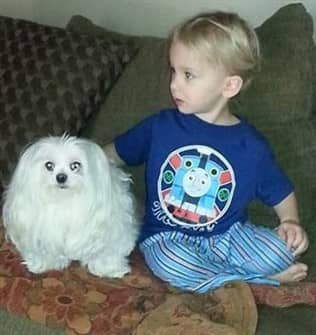
2. Use only top-quality products. Everything that comes into contact with a Maltese's body will either be detrimental or beneficial. So, take advantage of bath time to pamper your Maltese with moisturizing shampoos and conditioners.
Since seniors can have trouble with skin staying moisturized, Earthbath Oatmeal & Aloe, Vanilla & Almond Shampoo
 is ideal. And, if your guy or gal has specific issues, other options like their Tea Tree Oil & Aloe works well to heal hot spots, Mediterranean Magic is great for pulling out odors, and Eucalyptus & Peppermint offers soothing relief for irritated skin.
is ideal. And, if your guy or gal has specific issues, other options like their Tea Tree Oil & Aloe works well to heal hot spots, Mediterranean Magic is great for pulling out odors, and Eucalyptus & Peppermint offers soothing relief for irritated skin.
3. Use a leave-in conditioning spray, and during the summer consider one with sunscreen. A good spray will offer protection round-the-clock from outdoor elements. It will also help prevent drying, help stop contact friction, and prevent tangles which can cause terrible pinching on a senior.
You'll want to spritz the coat at least every 3 days and as much as every day. If your Maltese has a short coat, spritz and the crunch the hairs with your hands. If the coat is long, spritz about 1 inch from the roots, and then brush down to the tips to distribute the product.
Year-round, a good one to use is The Stuff Coat Conditioner ; this keeps the coat soft, adds a layer of protection that repels dirt, debris, allergens, and irritants, and has a nice clean smell.
; this keeps the coat soft, adds a layer of protection that repels dirt, debris, allergens, and irritants, and has a nice clean smell.
And, in the summer, you may wish to opt for one like Chris Christensen Ice on Ice Spray with Sunscreen
 that helps keep the coat in good shape while offering protection from UV rays.
that helps keep the coat in good shape while offering protection from UV rays.
4. Protect the nose
with a quality nose balm. Chapped noses are particularly common in the winter and overly dry noses are common in the summer. With senior dogs, once the nose develops issues, it can be particularly difficult to restore things back to normal. It's best to avoid problems in the first place by protecting the nose with a good butter or balm.
A recommended one is Snout Soother Nose Balm , which should be applied once a week for maintenance and 3 to 4 times per day to treat issues like dryness, peeling, cracking, or chapping.
, which should be applied once a week for maintenance and 3 to 4 times per day to treat issues like dryness, peeling, cracking, or chapping.
5. Protect the paws.
Maltese of every age can use a good paw protection; but this is even more applicable to seniors. Older dogs need help with traction, as well as having a barrier against tiny pebbles, cold ground surfaces, and hot walking surfaces.
For seniors, dry skin in between the toes or on the pads can quickly spiral into peeling or cracking; and this, as with many issues, is much harder to resolve than it is to prevent.
For protection purposes, apply a good wax like Musher's Secret Paw Protection
 once every two weeks. If your Maltese has moderate to severe drying or there are cracks in the paws, apply this 2 to 3 times per day. If things have progressed to bleeding, open sores, and/or cracks that are emitting pus, this warrants a vet visit as topical antibiotics are often needed.
once every two weeks. If your Maltese has moderate to severe drying or there are cracks in the paws, apply this 2 to 3 times per day. If things have progressed to bleeding, open sores, and/or cracks that are emitting pus, this warrants a vet visit as topical antibiotics are often needed.
6. Consider an omega 3 fish oil
for skin that is excessively dry and/or hair that is very brittle. This supplement is very beneficial for a dog's skin and coat, boosting elasticity, moisture, and overall good health.
An easy way to offer this is a liquid fish oil like Zesty Paw's Pure Wild Alaskan Salmon Oil for Dogs & Cats , which comes with a handy pump; you just add a bit to each dinner (mixing in well). This is 100% pure salmon oil that is made in the USA.
, which comes with a handy pump; you just add a bit to each dinner (mixing in well). This is 100% pure salmon oil that is made in the USA.
Tip # 5 - Adjust for Changes in Mobility and Activity
What happens:
As a dog ages, there is a general slowing down. An older dog will run slower, not be able to jump as high, and tucker out faster. There is a decrease in muscle mass, less flexibility, and a decrease in cardiac output.
Then, we must factor in canine osteoarthritis, which affects most seniors dogs.
Angel Biskit at 12 years old and Lil Tater at 9 years old, photo courtesy of Rosemary Moyes
Approximately 80% of dogs age 8 and over have some level of arthritis. Taking steps before this age can help avert this and certainly treatment for a Maltese with current osteoarthritis can offer some relief.
With arthritis, the cushioning between joints thins which causes bone to rub against bone which results in internal swelling, stiffness, and pain. As this progresses, bone can deteriorate as well.
What to do: There are many steps you can take to help keep your Maltese mobile well into his teens. And, there are several remedies to aid with sore joints and arthritis.
For general care & prevention:
- Continue to offer daily exercise. Moderate exercise is so important for both physical and mental health. Most senior dogs do best with established walking routes that offers no surprises. Aim for at least two 20-minute daily walks.
- Be sure that your Maltese has proper body support. With or without arthritis, an orthopedic bed is a life-saver for most seniors. Older Maltese spend an increasing amount of time resting and sleeping, so be sure that your dog is on a supportive mattress that takes the strain off of his body.
While it's important to let your older Maltese rest where he feels most comfortable, do not allow this to be on the floor or a sub par mattress. Your dog can choose the area, if it works for you, but you should choose the sleeping surface.
Many seniors like the security of a bolstered bed, but for those that just love laying on the floor, an orthopedic memory foam flat mattress is a good alternative.
- Feed your Maltese a high-quality food that is fortified
with not only the minimum vitamins and nutrients, but also extras like omega-3s and antioxidants.
- Offer a joint supplement.
Owners should consider offering this before a Maltese is into his senior years. Additional supplementation for adults at the 6, 7, or 8 year mark can help fend off joint issues. But, even if given once issues have already started, this can offer a dog relief from discomfort and improve mobility.
All senior Maltese can benefit from glucosamine which boosts the repair of damaged cartilage, chondroitin sulfate which helps cartilage retain water (needed for lubrication), and MSM (methylsulphynolmethane) which can help reduce pain and swelling. And for those already diagnosed with arthritis, a supplement with the addition of CoQ10 is often added to support heart health and boost the immune system.
A soft chew like Doggie Dailies Advanced Hip and Joint Supplementoffers the effective combination of glucosamine, chondroitin, MSM, and CoQ10, along with a vitamin blend and fish oil for maximum potency.
And for Maltese with suspected or diagnosed arthritis:
The signs and symptoms
of arthritis include:
- Signs of arthritis include:
- Hesitant to walk up or down stairs
- Trouble rising from a down position
- Yelping when touched or picked up
- Stiffness in gait, especially in the morning
So, if you suspect arthritis, and remember that the majority of senior Maltese will have this to some extent, have the veterinarian diagnose this. This is a progressive disease that you will want to catch early.
Treatment
includes most of the prevention elements as mentioned above (exercise, body support, joint supplements). Also, dogs that have trouble with mobility can benefit from steps or ramps that they can use to go up onto furniture. It allows them to retrain independence.
Additionally, the vet may prescribe medications.
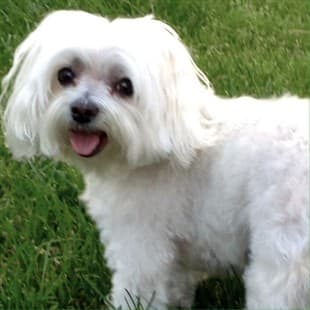
Anti-inflammatory medications - Prednisone, dexamethasone, or other corticosteriods may be prescribed and/or NSAID medications may be prescribed for pain and swelling.
Tip #6 Understand Behavioral Changes
As your Maltese enters into the senior years, there will be some expected behavioral changes. However, for some dogs, there can be more pronounced cognitive issues.
First, let's look at what is normally expected:

Bella, at 9 years old,
photo courtesy of Silvia McNeil
1. Changes in sleep.
Overall, seniors nap more often than their adult counterparts. However, sleep at night may be restless.
You can help having several areas of the home prepped for naps, with a bed in a quiet corner, no clutter, and no foot traffic.
For better sleep at night, do be sure that your Maltese has a proper orthopedic memory foam bed.
2. Incontinence.
It's not that older dogs forget house training; it's a matter of bladder muscles weakening.
You can help by taking your Maltese outside for bathroom trips more often. Report Incontinence issues to the vet, since these can be caused by UTIs and other conditions, and if needed obtain a doggie diaper for your female or a belly band for your male.
4. Lower tolerance for noise and commotion.
Puppies are often oblivious to what's happening in the house, and adults often 'roll with it'; but, senior dogs often have trouble coping with perceived chaos.
An older Maltese may have very little patience for young children, loud TVs, or a house full of visitors.
You can help by making sure that your Maltese always has a choice to stay or retreat to a quiet place. And young children should be instructed in regard to the dog's preferences and limitations.
Try to limit loud noises such as blaring TVs or music.
5. Clingy behavior.
Older dogs that were once rather independent may start showing signs of anxiety when left home alone. For this, follow all guidelines to reduce separation anxiety.
Other possible changes:
Other, more pronounced and sometimes baffling changes in behavior may be attributed to CCD (Canine Cognitive Dysfunction), which is the canine equivalent of dementia.
Of dogs age 11 and up, 50% have some level of CCD. And for dogs that are 15+ years, 68% have at least one sign of this.
Signs of CCD include:
- Disorientation/confusion - This can happen even in familiar surroundings, but is often much worse when in a new settings. Dogs may stare at wall, go to the wrong doors, misjudge distances, etc.
- Restlessness, irritation
- Acting withdrawn
- Shaking (or other signs of fear)
- Lethargy
- Excessive licking
- Forgetting commands or established rules
- Trouble understanding
- Incontinence
- Decreased appetite
- Changes in sleep
Treatment:
Anipryl (selegiline), a drug used to treat Parkinson's in humans, has been shown to slow the progression of canine cognitive dysfunction; you may want to speak to your vet about prescribing this.
In addition, you can help your Maltese by:
- Not changing the layout of the house
- Only visiting places that would qualify as familiar
- Keep noises and commotion to a minimum
- Give your Maltese antioxidants and omega-3 fatty acid supplements, which have been shown to promote cell health
- Continue to provide both physical and mental stimulation via walks and games
Tip #7 Make Adjustments for Lower Tolerance for Changing Temperatures
Senior Maltese dogs often have more trouble tolerating cold winter weather and hot summer temperatures than their younger counterparts.
You'll want to take steps to help your Maltese feel comfortable, since staying active is vital for both physical and mental health.
In the winter, you can help by:
- Making sure that your Maltese has a proper canine bed (as previously discussed)
- Checking your Maltese's resting and sleeping areas for drafts. Be sure to get down on the floor at your dog's level to see if any cold air in entering into the house via outlets, windows, or doors.
- Place a soft, small, doggie blanket on your Maltese's bed for additional snuggling purposes.
- Bundle your dog up on chilly autumn days and cold winter days - A lined vest over your Maltese's core body can make all the difference.
In the summer, you can help by:
- Having your Maltese rest on a cooling mat (these do not emit cold, but rather draw excess body heat from a dog)
- Offer a raised coat - these allow for air flow under the body to help keep a dog cool
- Give frozen treats like frozen blueberries or raspberries (healthy and high in antioxidants)
- Encourage proper water intake
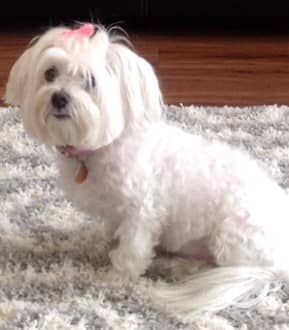
A Final Word
None of us want to see our Maltese transition into the senior years. But, being in denial that this life stage is occurring could mean not providing proper care. So, if your Maltese is 8 years or older, reassess care on all levels to see where changes may need to be made.
Are You a Member Yet?
Become a free PetMaltese Member
- This will allow you to receive a friendly reminder when new pages of Maltese info are added to the site. You will also be able to submit photos of your adorable Maltese to be added here, and be able to suggest a topic for us to write about.
Spotlight Article
There are 5 steps to keep a Maltese ultra white, while maintaining excellent skin and coat health.

-min-450x169-1920w.jpg)
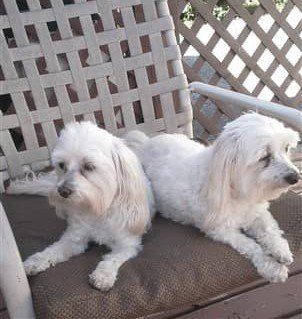
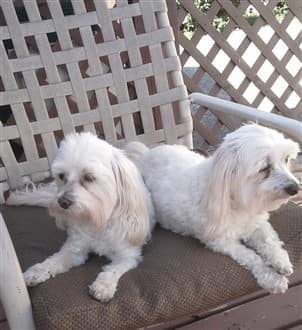


-min-180x187-1920w.jpg)